- Home
- Amy Jarecki
The Highland Earl Page 4
The Highland Earl Read online
Page 4
Chapter Four
Wrapped in a warm robe and drinking a steaming cup of chamomile tea, Evelyn shuddered at the sight of the doublet draped across the foot of her bed.
Lucinda placed a lump of coal on the fire. “Now that you’ve shooed your sisters away, I’m dying to know exactly what happened, my lady.” For the past five years, Lucinda had served as Evelyn’s lady’s maid and the two had grown close. Though she couldn’t share everything with the maid, Evelyn was more comfortable talking to Lucinda than to anyone else.
“’Tis as Lady Phoebe said. She fell, and her toy boat went off course. I tried rescuing it with a stick and only managed to push the tiny schooner into a grove of lily pads, where it wouldn’t budge. The earl was busy tending my sister, so I tried to be a hero and dangle from a tree branch while reaching for the silly thing—”
“And the limb snapped?”
“Yes, dunking me in that filthy lake water, mind you.” Evelyn sipped her tea. “If that wasn’t horrifying enough, the wool stretched on my gown and left the tips of my bosoms exposed to all of London.”
Lucinda turned away and set to dusting—rather vigorously. “Oh, how mortifying.”
“Worse, I was so worried about Phoebe and saving the silly HMS Thistle, I didn’t notice my abominable state of undress until His Lordship bade me to adjust my person.”
“It grows worse.”
Evelyn set her cup in the saucer. “At least I no longer need to worry about Mar’s possible interest in courting me.”
“Do you not like him? I would think an influential earl such as he would be an ideal husband. And he’s undeniably handsome.”
“But he’s a queen’s man.”
“Is that so bad?”
Evelyn feigned indifference while she reached for a book. If Mar were allied with the Earl of Seaforth or the Marquis of Tullibardine, she might think differently, but she didn’t want to marry someone who supported her father’s politics. And in her estimation, Mar was blameworthy by association. Papa was very particular about his alliances. As a queen’s man, it was undeniable that the Earl of Mar’s position of influence with the crown impressed the duke. That in itself made Evelyn suspicious of John Erskine’s character. A man like Mar possessed the connections to mitigate investigations into the duke’s smuggling operations, should they arise.
Was Mar heartless as well? Did he ruin men’s lives by turning them out in their advancing years without even a pension as meager as a shilling per month?
Did he pay unlivable wages to the employees of the coal mine he owned? Did he force children to work in inhuman conditions? Did the earl smuggle his coal into England without paying the queen’s duties—duties he and the Duke of Kingston-upon-Hull had voted to impose on the rest of the kingdom’s subjects? Evelyn would wager that, just like her father, Mar went to excessive lengths to avoid paying taxes.
If she married someone like the earl, she’d end up fighting him tooth and nail. She’d rather remain a spinster than support tyranny under her own roof.
“Looks fade with time,” Evelyn replied.
“Well, I think you ought to consider his suit.”
“And what makes you such an expert?” She gave Lucinda a playful smack. “There is no suit whatsoever. Did I not just say there would be no courtship? I bared my breasts, though unknowingly, in a public park. He most likely thinks me a harlot.”
“I’m not convinced.” Lucinda giggled and scooted beyond Evelyn’s reach. “Most men are rather enamored with women’s breasts.”
“Oh yes? And you have vast experience with such matters?”
“I might be a lady’s maid, but I’m not dead. You would be amazed at what goes on in the servants’ quarters.”
“Ooo, that sounds interesting.” As well as a delightful change in subject. Evelyn scooted to the edge of her seat. “Do tell.”
“And lose my position?”
“You know you can trust me.”
Lucinda drummed her fingers together. “Well, last night the footman was reprimanded for inappropriately groping a scullery maid.”
“Who did the reprimanding?”
“Porter, of course.”
“Our humorless butler,” Evelyn groaned. “My father employs the most pompous, dreary servants in England.”
The maid scoffed. “I beg your pardon?”
“Forgive me. I was referring to Porter and the housekeeper…and Mrs. Filch. Thank heavens I no longer need a governess.”
Lucinda picked up Evelyn’s lake-soiled gown from the floor. “I’d best set to cleaning this.”
“I think it is ruined. And if you manage to repair the neckline, please remind me never to wear it anywhere near a body of water.”
The maid chuckled. “Will there be anything else, my lady?”
“Please have the footman’s doublet cleaned and ask Porter to return it to Mar’s residence with my thanks.” Evelyn never wanted to set eyes on the garment again. It presently served as an unwanted reminder of the day’s humiliation.
Once alone, she took the candelabra from the table and tiptoed to the door. It was Saturday evening—the night when Papa played cards at the gentlemen’s club. That meant Saturday night was Evelyn’s opportunity to pay a stealthy visit to the library…and the strongbox where her father kept his conspiratorial correspondence.
Quietly, she hurried to the lower floor. When she reached the library, she stopped and listened—with a house full of servants, one could never be too careful.
Still, when the door swung open, her heart nearly burst. Goodness, she hadn’t heard a single footstep.
“Lady Evelyn,” said Porter, looking as if he’d just swallowed a bitter tonic. “I expected you to be abed after the day’s ordeal.”
“Can’t sleep.” She slipped inside. “And I need a new book.”
“Then I shall leave you to it.”
“Porter,” she ventured. “Is something amiss? I didn’t expect to see you here.”
The butler inclined his head toward the writing table. “A missive arrived for your father.”
She offered a warm smile. “I see. Good night.”
“Good night, my lady.”
As soon as the door closed, she released a long breath. Porter poked his nose into everything in this house. He was the most likely to discover Evelyn spying, and she absolutely could not slip with him nearby. Not ever. She locked the door for good measure, then hastened to the writing table.
Good heavens, the missive was from Mar. Evelyn set her candelabra down and stared at the red seal, her hands perspiring. Papa kept a sharp dagger in the drawer. Should she open it? Did she care enough to risk breaking the seal? After the events of the day, surely the letter was an apology of some sort. And she doubted Mar would ever come calling with a dozen white roses ever again.
She chuckled at the irony, though something inside grew heavy, almost melancholy. To end a courtship before it began was for the best. The earl would soon find a wife—someone who wasn’t as opinionated as Evelyn and someone who knew how to manage boys.
She replaced the missive exactly as she’d found it, her fingers itching to hold the seal over the flame just long enough to soften the wax, then run the dagger beneath, quickly read, then reseal it.
Yes. In the name of James Stuart, she’d levered her father’s unopened missives before, though doing so was fraught with danger. There was always a chance the wax seal would crack, and then Papa would suspect someone had meddled. Such risks were better left to more important business—things that would help the cause, things she must share with Mr. Dubois.
How much her life had changed the day she met the Frenchman. He’d first approached her at the hospital for wounded soldiers in Nottingham, where she read to the infirm on Tuesdays and Thursdays. Evelyn’s eyes had already been opened to her father’s pitiless oppression, but Mr. Dubois led her to see the extent of Papa’s treachery. Not only did her father dismiss elderly servants without a livable pension, he used children in his mini
ng operations and paid everyone in his employ far less than they deserved. Once Evelyn had learned the truth, it became her civic duty to help the Frenchman when he’d asked. Moreover, Mr. Dubois desperately needed her assistance in his quest to repeal the Act of Succession to enable Prince James to succeed to the throne. Only then would there be a hope for justice to prevail.
Evelyn shared information with the Jacobite emissary on the grounds that he would never incriminate her father or her family. The information was supplied only to help her quest to work toward fairer taxation for all British subjects, as well as better pay and conditions for laborers—which she was convinced would happen once James Stuart succeeded to the throne. Hers was a noble cause, and she would forgo her own happiness to see such positive change occur throughout Britain.
Moving on to more important matters, she opened the drawer and removed the false bottom, exposing the compartment where Papa kept the key to his strongbox. What have you been up to this past week, Papa dearest?
The hinges on the box creaked when she opened it. Jolting, she took a panicked look over her shoulder, even though the door was locked. Perhaps on her next visit to the library she ought to bring some oil for the hinges.
But then I would be leaving evidence of tampering. Not a good maneuver for a spy.
Inside she found a mountain of coin and banknotes, none of which she ever touched. What interested Evelyn was the correspondence Papa neatly stacked on the right-hand side.
Here’s something new. It was a letter from the captain of the East Indian, one of the ships from Holland—a Dutch fluyt Papa had engaged on several occasions.
She pulled out the missive and sat while unfolding it. Evidently the captain had reported the ship wrecked off the Shetland Islands, but in truth it was hidden in a cove near Bettyhill, a remote village in northern Scotland. Among other things, the East Indian’s hull contained one hundred barrels of coffee, fifty barrels of rum, and a chest of Spanish gold.
He’s nothing short of a pirate.
Reading on, she discovered that the captain intended to refit the ship, rename her the Flying Robin, and then sail her to Papa’s dockyard in the town of Hull, where the booty would be hidden in hay wagons and smuggled into London. Of course, the captain hadn’t used the terms smuggled and booty, but he may as well have.
Committing the contents to memory, Evelyn refolded the missive, replaced it in the box, and locked it. As she pulled open the drawer to return the key to its hiding place, heavy footsteps came from the town house stairs. Her heart thrummed. Father never returned this early.
In her haste to return the key, she dropped it. Diving under the writing table, she snatched it from the carpet, slid the key into the drawer, and closed it just as keys jangled. The lock clicked and the door opened.
As footsteps approached, Evelyn gathered the hem of her robe and tucked it under her knees. What would she say if Papa discovered her? Good heavens, why was she hiding? She’d told Porter she was looking for a book. That would have been easy enough to explain.
Papa’s square-toed shoes stopped in front of her. “Odd. Porter must have left the candle burning. It’s not like him to be careless. And why the blazes did he lock the door, the imbecile?”
Her heart raced. What should she do? Play a trick by untying his garters and telling him it was her candle? Say she’d dropped a hairpin? Good heavens, that might have worked if she was still five years of age.
Please leave!
Parchment rustled while Papa sat, his feet sliding mere inches from Evelyn’s legs. Her every breath sounded like a gale-force wind while she pushed herself flush against the wall. Was he reading Mar’s missive?
“I’ll be damned,” Papa said, right before he blew out the candles.
When the door to the library closed, Evelyn released an enormous breath. No matter how much she wanted to run, she waited in the darkness until the sound of his footsteps was long gone. Only then did she climb out from under the writing table. Her fingers brushed Mar’s opened missive, though she could scarcely see the contrast of the parchment with the walnut finish. Still, she picked up the letter and inclined it to the window, hoping the moonlight would provide enough light for her to read the contents. Unfortunately, the only legible word was Mar, signed in a bold hand at the bottom.
Convinced her intuition was right, she replaced the missive and tiptoed back to her chamber.
As soon as she arose the next morning, Evelyn placed a silk sunflower in her window. It stood as the Jacobite symbol of loyalty because the head of the flower always follows the sun, but no one in her household, including Lucinda, had any clue the sunflower was used as a sign to inform Mr. Dubois that she had information to impart. A day later, she would slip away to the Copper Cauldron in the alley off Bourdon Street, the headquarters where the French emissary would be waiting.
When she went down to break her fast, Evelyn was surprised to find His Grace had already left the house for White’s Gentlemen’s Club. Papa’s absence was both a relief and a disappointment. Surely he would be displeased with Mar’s decision but eventually would realize it was for the best. Perhaps Father would brush the matter under the carpet and say nothing. After all, Mar hadn’t mentioned the prospect of courting her—he’d merely spoken of courting in more general terms.
While nibbling a slice of toast, Evelyn thoroughly convinced herself the subject had been put to rest with no harm done aside from a tad of injured pride. She turned her attention to her sisters and their appointments for the day while the anticipation of her meeting with Mr. Dubois made her anxious. Tomorrow seemed as if it would never arrive.
But come it did, and promptly at ten o’clock, Evelyn sneaked away with old Brutus as her chaperone under the guise of taking the waddling Corgi for a stroll. Fortunately, Jacobite headquarters were only a few blocks from the town house, lest she be discovered unchaperoned and Brutus expire from overexertion.
When she turned down the shadowy and narrow alley, she clamped the lead tighter, thankful for the dog. Though not a spry young pup, Brutus could bark. It might be Mayfair in the middle of the day. And the men who comprised the Jacobites in London might be gentlemen whom she trusted implicitly. But a highborn lady without a proper chaperone could never be too careful. If anything happened to her, it would mean the end of her involvement in the cause forever.
From Evelyn’s conversations with Mr. Dubois at the soldiers’ hospital, she’d learned a great deal about her father’s corruption. Time and time again she’d become aware of the poverty of the tenants under Kingston-upon-Hull’s care, but through the Frenchman she’d learned so much more, worst of all the extent of Papa’s smuggling operations. To her dismay, the duke grew richer while those working in his shadow fell into dire straits.
Those conversations marked a turning point in her life. It was as if she’d been living in a gilded castle and suddenly the walls had crumbled around her. Moreover, when she’d confronted the Duke of Kingston-upon-Hull about his misdeeds, he’d laughed and told her she was naïve and too kindhearted—mainly due to the curse of her sex.
But now she’d found a way to do something about the tyranny. Because she, a mere woman, could be of use in bringing about justice, she stepped into the indistinct coffeehouse as if she belonged. As usual, the Copper Cauldron’s clientele comprised astute men dressed in breeches or kilts, doublets and periwigs. In truth, no respectable woman ought to be seen in a coffeehouse.
Excepting this one.
The heady aroma of ground beans and simmering brew wafted through the smoke-filled air. Evelyn covered her cough with a lacy kerchief.
Two armed guards positioned at the door watched her move inside. Hired by Mr. Dubois, they posed as a deterrent for any patrons who wandered in merely looking for a bowl of strongly brewed Turkish coffee and perhaps a morsel of cake.
Mr. Dubois gave a nod from the back of the room, where he sat against the wall near the steaming cauldron. Beside him, a young man pushed back his chair and stood. The
Frenchman followed suit, albeit a fair bit slower.
“Bonjour. How fares your day, my lady?” asked the emissary as he gestured to the man. “This is our sea captain, Sir Kennan Cameron. He has put into service a new three-masted barque.”
She curtsied. “Captain? Of a tall ship? I am duly impressed.”
“Do not let his youthful face fool you, mademoiselle. Sir Kennan sailed under Scotland’s Baronet of Sleat and has recently been knighted by James. You’ll not find a captain more fit for the perils of the sea or more loyal to the cause.”
Sir Kennan skirted around the table and held her chair. “Mr. Dubois tells me you have been an invaluable resource, m’lady.”
She tucked under her skirts and sat. “I hope so. I’d like to make a difference.”
“Oui, and you have.” Mr. Dubois signaled for the maid to bring three dishes of coffee. Honestly, Evelyn found the bitter brew muddy and coarse. But she always drank it without complaint. In this coffeehouse she was amongst the only people she considered allies.
The Frenchman smiled. Oddly, for some inexplicable reason, the intensity of his stare always made her stomach agitated. “Now, tell us your news.”
She settled herself by taking in a deep breath. “A Dutch fluyt, the East Indian, is moored in a cove in the north of Scotland near Bettyhill. She was reported wrecked off Shetland, but in truth she’s laden with one hundred barrels of coffee, fifty barrels of rum, and a chest of Spanish gold. They’re undertaking a refit, then will sail to Hull, where the cargo will be hidden in hay wagons and shipped to London.”
“Rum and coffee, oui?” asked Mr. Dubois, giving the maid a nod as she set three dishes of brew on the table.
“And gold,” Sir Kennan added. “The coin ought to come in handy as James prepares to sail across the channel.”
The emissary drank his brew thoughtfully. “You have a point, though I’m not worried about the contents of her cargo. England appears to have coffee beans aplenty, and a hold full of rum oughtn’t affect sales of spirit overmuch.”

 The Highland Rogue
The Highland Rogue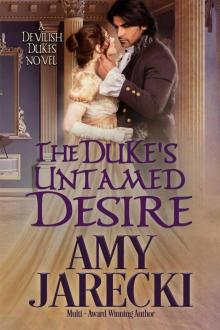 The Duke's Untamed Desire
The Duke's Untamed Desire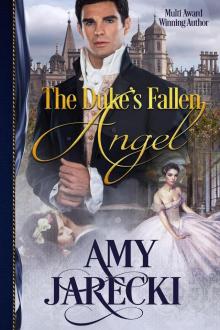 The Duke's Fallen Angel (Devilish Dukes, #1)
The Duke's Fallen Angel (Devilish Dukes, #1) The Highland Laird
The Highland Laird The Highland Dynasty: The Complete Series
The Highland Dynasty: The Complete Series Highland Warlord
Highland Warlord Highland Warlord (The King's Outlaws Book 1)
Highland Warlord (The King's Outlaws Book 1) The Highland Earl
The Highland Earl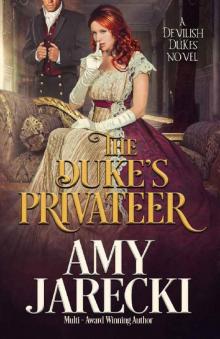 The Duke's Privateer (Devilish Dukes Book 3)
The Duke's Privateer (Devilish Dukes Book 3)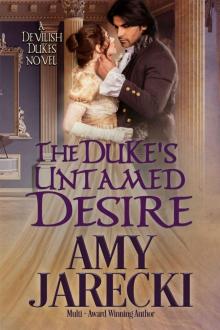 The Duke's Untamed Desire (Devilish Dukes Book 2)
The Duke's Untamed Desire (Devilish Dukes Book 2) Highland Knight of Dreams: Scottish Historical Romance (Highland Dynasty Book 5)
Highland Knight of Dreams: Scottish Historical Romance (Highland Dynasty Book 5) The Highland Duke
The Highland Duke Body Shot
Body Shot The Highland Renegade
The Highland Renegade The Valiant Highlander (Highland Defender #2)
The Valiant Highlander (Highland Defender #2) Rise of a Legend (Guardian of Scotland Book 1)
Rise of a Legend (Guardian of Scotland Book 1) Highland Raider
Highland Raider Hunt for Evil (ICE Book 1)
Hunt for Evil (ICE Book 1) The Highland Chieftain
The Highland Chieftain Beauty and the Barbarian
Beauty and the Barbarian The Highland Commander
The Highland Commander Mach One: An International Clandestine Enterprise Novel (ICE Book 3)
Mach One: An International Clandestine Enterprise Novel (ICE Book 3) The Chihuahua Affair: Best in Show
The Chihuahua Affair: Best in Show The Time Traveler's Christmas (Guardian of Scotland Book 3)
The Time Traveler's Christmas (Guardian of Scotland Book 3) Knight in Highland Armor
Knight in Highland Armor In the Kingdom's Name (Guardian of Scotland Book 2)
In the Kingdom's Name (Guardian of Scotland Book 2) Rescued by the Celtic Warrior (Roman Love ~ Pict Desire Series Book 1)
Rescued by the Celtic Warrior (Roman Love ~ Pict Desire Series Book 1) A Highland Knight's Desire (A Highland Dynasty Book)
A Highland Knight's Desire (A Highland Dynasty Book) The Fearless Highlander (Highland Defender Book 1)
The Fearless Highlander (Highland Defender Book 1) Celtic Maid (Roman Love ~ Pict Desire Series Book 2)
Celtic Maid (Roman Love ~ Pict Desire Series Book 2) Captured by the Pirate Laird
Captured by the Pirate Laird The Highland Henchman
The Highland Henchman Return of the Highland Laird: A Highland Force Novella
Return of the Highland Laird: A Highland Force Novella Highland Knight of Rapture (Highland Dynasty Book 4)
Highland Knight of Rapture (Highland Dynasty Book 4)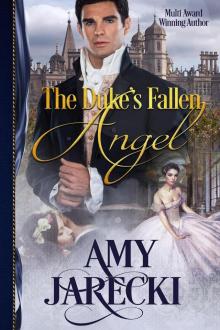 The Duke's Fallen Angel
The Duke's Fallen Angel The Highlander's Iron Will: A Highland Defender Novella
The Highlander's Iron Will: A Highland Defender Novella